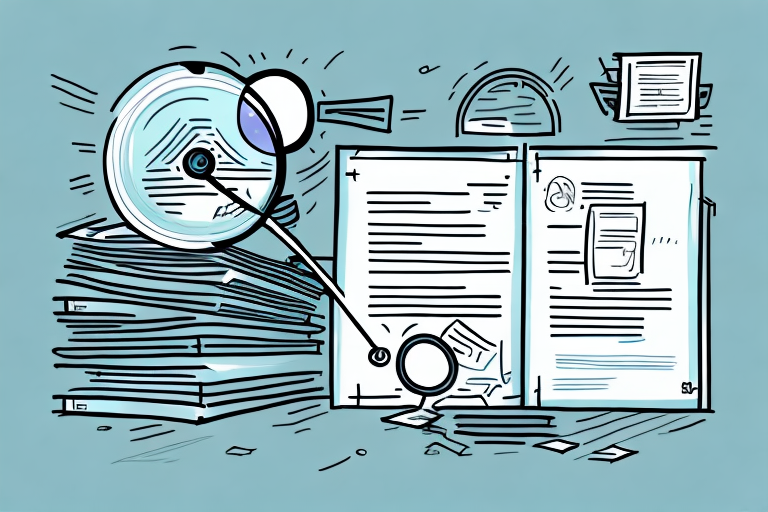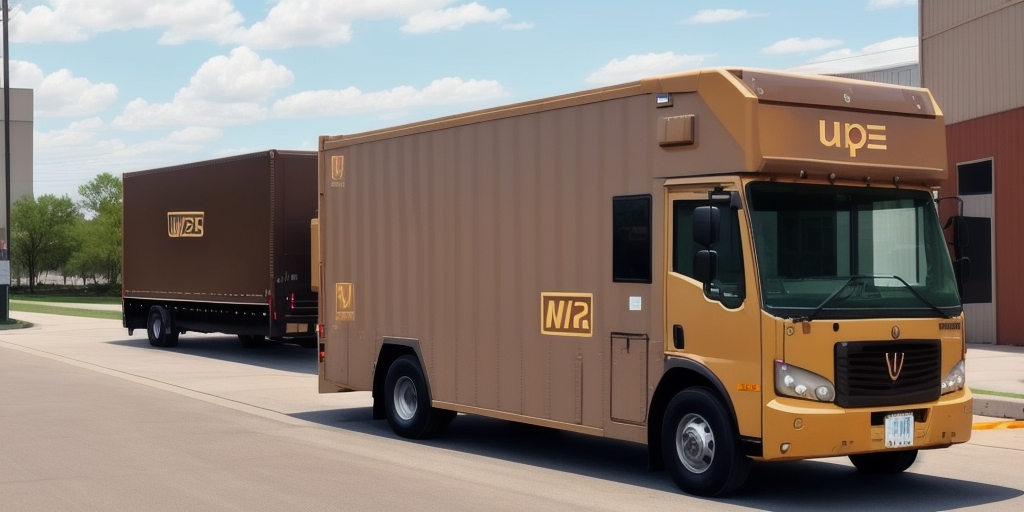Understanding the Role of a UPS Auditor
If you are considering a career as a UPS (United Parcel Service) auditor, there are several important factors to consider. UPS auditing is a critical function in logistics and supply chain management. The primary objective of UPS auditing is to ensure that companies comply with UPS policies and procedures while striving for continuous improvement. This article provides an in-depth look at what a UPS auditor does, how to become one, the necessary qualifications and education, and the challenges you may encounter along the way.
What is a UPS Auditor?
A UPS auditor is responsible for ensuring that companies adhere to UPS procedures and policies, as well as recommending opportunities for continuous improvement. Their role involves examining various aspects of a company’s operations to ensure compliance with UPS standards. In logistics and supply chain management, UPS auditors identify strengths and weaknesses in existing processes, then recommend solutions to optimize efficiency, improve productivity, and ensure regulatory compliance.
- Conducting Regular Audits: Reviewing documentation, observing processes, and interviewing employees to ensure procedures are followed correctly.
- Reporting: Compiling reports detailing areas of non-compliance and providing recommendations for improvement.
- Training and Education: Conducting training sessions or providing one-on-one coaching to ensure all employees understand their roles and responsibilities.
The Role of a UPS Auditor in Logistics and Supply Chain Management
The role of a UPS auditor is multifaceted, requiring the use of various techniques to evaluate and improve organizational processes. Key responsibilities include:
- Assessments of Logistical Procedures: Evaluating the effectiveness of current logistical processes.
- Identifying Deficiencies: Documenting weaknesses in operational procedures.
- Recommendations for Corrective Actions: Suggesting improvements and supporting the implementation of corrective action plans.
- Compliance: Ensuring adherence to industry standards and regulations by staying updated with the latest guidelines.
- Cost Savings and Process Improvements: Analyzing data to streamline operations and reduce waste, such as optimizing transportation routes or implementing new technologies.
For more information on industry standards, refer to the Bureau of Labor Statistics.
Why Become a UPS Auditor?
Becoming a UPS auditor offers a rewarding career path for individuals who enjoy problem-solving and providing strategic support to organizations aiming for regulatory compliance. Benefits of this career include:
- Workplace Culture: UPS is known for its positive workplace culture with opportunities for advancement into leadership positions.
- Global Opportunities: A chance to build a successful career in global logistics and supply chain management, including opportunities to travel extensively.
- Comprehensive Training: Access to comprehensive training and development programs to equip auditors with necessary skills and knowledge.
- Competitive Compensation: UPS offers competitive salaries and benefits, including health benefits, retirement plans, and paid time off.
- Diversity and Inclusion: UPS is committed to diversity and inclusion, providing a supportive work environment that values all employee contributions.
Qualifications and Education Required for UPS Auditors
To become a UPS auditor, the following qualifications and educational background are typically required:
- Educational Requirements: A bachelor’s degree in business, logistics, supply chain management, or a related field.
- Work Experience: Relevant experience in logistics and supply chain management, with specific knowledge of transportation, warehousing, and customs regulations.
- Technical Skills: An information technology background is desirable, as many businesses use automated systems to manage logistics operations.
- Soft Skills: Excellent communication and analytical skills, leadership qualities, and a comprehensive understanding of performance-management metrics.
Additionally, UPS auditors must have a strong attention to detail and the ability to work under pressure, ensuring compliance with local and international regulations. Ongoing education and professional development are essential to stay current with industry trends and regulatory changes.
The Skills and Traits Needed to Succeed as a UPS Auditor
Successful UPS auditors possess a combination of technical and interpersonal skills, including:
- Analytical Skills: Ability to analyze data, financial statements, and identify discrepancies.
- Communication Skills: Excellent verbal and written communication skills to effectively convey findings and recommendations.
- Leadership Skills: Ability to lead audits, manage teams, and influence stakeholders.
- Attention to Detail: Precision in reviewing processes and identifying areas for improvement.
- Adaptability: Ability to adapt to changes in industry regulations and emerging technologies.
- Ethical Conduct: Commitment to maintaining high professional and ethical standards.
For more information on essential skills for auditors, visit the Institute of Internal Auditors.
How to Obtain Certification as a UPS Auditor
Certification enhances credibility and career prospects for UPS auditors. The steps to obtain certification include:
- Earn a bachelor’s degree in a relevant field.
- Gain substantive work experience in logistics and supply chain management.
- Undergo specialized training in auditing techniques, risk management, and compliance.
- Pass rigorous examinations from professional bodies such as the Institute of Internal Auditors (IIA) or the Chartered Institute of Logistics and Transport (CILT).
Certified auditors are responsible for conducting audits of UPS facilities and operations worldwide, collaborating with management to identify improvement areas and develop strategies to enhance efficiency, reduce costs, and improve customer satisfaction.
Job Outlook and Salary Expectations for UPS Auditors
UPS auditor positions offer competitive salaries and excellent benefits, including opportunities for career advancement. According to the Bureau of Labor Statistics, the job outlook for auditors and accountants is expected to grow by 6% from 2018 to 2028, about as fast as the average for all occupations. This growth is driven by increasing financial regulations and the need for businesses to comply with them, ensuring a stable and secure job outlook for UPS auditors.
- Salary Range: Varies based on expertise, position, and location. Entry-level auditors can expect competitive starting salaries, with experienced auditors earning significantly more.
- Benefits: Medical and dental insurance, life insurance, paid vacation and sick time, and continuous training and education opportunities.
UPS is committed to diversity and inclusion, providing a dynamic and diverse work environment. Auditors work with a wide range of stakeholders, including internal teams, external auditors, and regulatory bodies, offering a unique and challenging work experience.
Different Types of Audits Conducted by UPS Auditors
UPS auditors conduct various types of audits to evaluate different aspects of an organization's logistics and supply chain processes, including:
- Risk Assessment Audits: Evaluating potential risks in logistics operations and developing strategies to mitigate them.
- Compliance Audits: Ensuring adherence to UPS policies, industry standards, and regulatory requirements.
- Operational Audits: Assessing the efficiency and effectiveness of operational procedures.
- Financial Audits: Reviewing financial records and transactions related to logistics operations.
- Cybersecurity Audits: Evaluating the security of information systems used in logistics management.
Each audit type follows specific procedures and techniques to ensure that organizations follow best practices and minimize risk exposure in their logistics processes.
The Importance of Ethical Conduct in UPS Auditing
Ethical conduct is paramount in the auditing profession, including UPS auditing. UPS auditors must maintain high professional standards and adhere to the Institute of Internal Auditors’ global standards. Key aspects of ethical conduct include:
- Professional Integrity: Ensuring transparency and honesty in all audit activities.
- Objectivity: Maintaining impartiality and avoiding conflicts of interest.
- Confidentiality: Protecting sensitive information obtained during audits.
- Accountability: Taking responsibility for audit findings and recommendations.
Adhering to ethical principles helps maintain credibility and trust in the audit process, ensuring unbiased and accurate assessments.
Common Challenges Faced by UPS Auditors and How to Overcome Them
UPS auditors encounter several challenges in their roles, including:
- Time Constraints: Tight deadlines can make thorough auditing difficult.
- Language Barriers: Working in diverse, global environments may involve multiple languages.
- Cultural Differences: Understanding and navigating different cultural norms and business practices.
- Complex Auditing Standards: Keeping up with evolving standards and regulations.
- Data Analysis Difficulties: Managing and interpreting large volumes of data.
To overcome these challenges, UPS auditors should:
- Develop strong communication, analytical, and problem-solving skills.
- Build robust professional relationships to navigate cultural and language barriers.
- Stay updated with the latest industry trends and regulations through continuous education.
- Utilize advanced data analysis tools and techniques to manage and interpret data efficiently.
Advancement Opportunities for UPS Auditors
Becoming a certified UPS auditor lays a strong foundation for career advancement in the logistics and supply chain field. With dedication and continuous learning, UPS auditors can progress to higher-level positions such as:
- Senior Auditor: Leading larger and more complex audit projects.
- Audit Manager: Overseeing audit teams and managing audit processes.
- Logistics Manager: Managing overall logistics operations and strategy.
- Supply Chain Director: Leading the entire supply chain management function.
The global shift towards electronic distribution systems and emerging technologies further expands opportunities for UPS auditors to develop their skills and assume influential roles within the logistics and supply chain industries.
Conclusion
Becoming a UPS auditor requires a commitment to excellence in logistics and supply chain management, along with adherence to professional standards. With the right qualifications, relevant work experience, and proper certification, individuals can embark on a successful career path as a UPS auditor. The UPS auditing field is dynamic and ever-evolving, offering exciting opportunities to work in a fast-paced, cutting-edge environment. By dedicating themselves to continuous improvement and professional development, UPS auditors can advance to leadership roles and make significant contributions to the logistics and supply chain industry.








